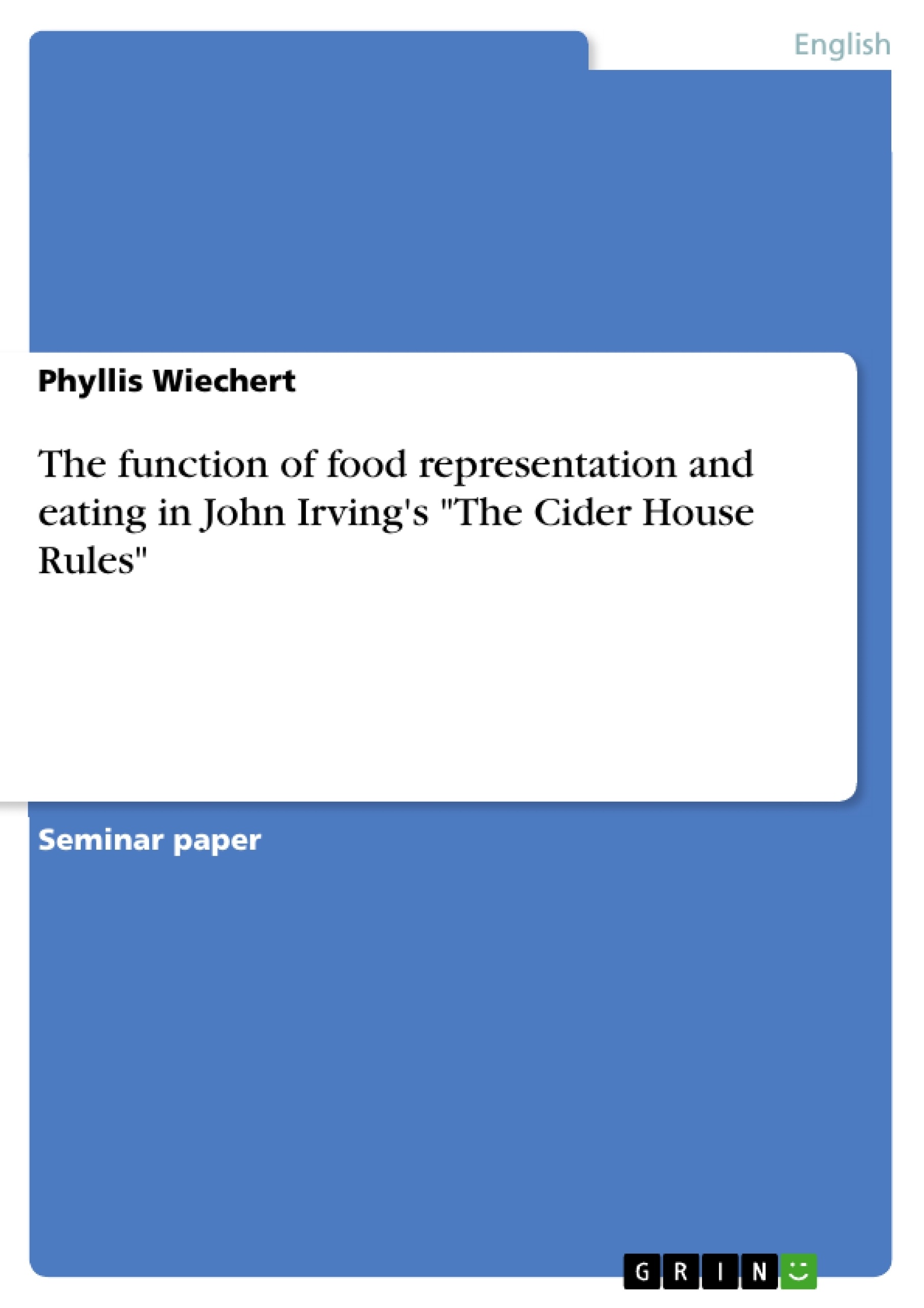The purpose of this paper is to analyze the question of the function of food representation and eating in the novel “The Cider House Rules” by John Irving, first published in 1985 by William Morrow.
The relevance of this question can already be found in the title of the novel. Since the title “The Cider House Rules” combines food, or better drink with rules and housing, there must be some deeper connection between them. What exactly is meant by these rules? These rules must be social agreements, which again are connected to food and drink.
The novel also relates to a local and regional culture, the culture of apple growing, to Maine, and to certain social structures.
It would be of interest to analyze the influence food has on the novel’s main characters. All these questions lead to the main question and are going to focus on the function that food and drink have in the novel.
In the first part, this paper gives background information on the novel’s settings in Maine and gives theoretical reference to the cultural anthropologist Claude Levi-Strauss and the social and literary critic Roland Barthes.
The second part will then focusing on Homer Wells, one of the main characters in the novel. It concentrates on the influences the other characters have on Homer Wells, especially Dr. Larch, Melony, Candy, Wally, and the migrants. Then the symbolic meaning of apples will be discussed. Homer Wells’ most forming moments on the orchard will be explained and also how his life is connected with apple farming.
In the third part the relation of the title and the novel will be analyzed. This includes also the reasons for the cider house. The results will be summarized in the end.
Inhaltsverzeichnis (Table of Contents)
- Introduction
- Social structure
- Maine
- Theories on food
- Claude Levi-Strauss
- Levi-Strauss and Irving's Cider House Rules
- Apple cider
- Apple blossom honey
- Apple jelly
- Apple Pies
- Results
- Roland Barthes
- Roland Barthes and Irving's Cider House Rules
- The Worthington's
- The apple farmers
- The migrants
- Results
- Homer Wells
- The influence other characters have on Homer
- Homer Wells - Dr. Larch
- Homer Wells - Melony
- Homer Wells - Candy and Wally
- Homer Wells - pickers
- Symbolic meaning of apples
- Apples and the novel
- Formative moments on the apple orchard for Homer Wells
- Connection of apple farming and Homer's personal development
- The influence other characters have on Homer
- The connection of the title and the novel
Zielsetzung und Themenschwerpunkte (Objectives and Key Themes)
This paper examines the function of food representation and eating in John Irving's novel "The Cider House Rules," first published in 1985. The analysis focuses on the connection between food, social structures, and the development of the main character, Homer Wells. The title, "The Cider House Rules," itself suggests a connection between food, rules, and housing, indicating a deeper social and cultural significance. The novel explores the culture of apple growing in Maine and its influence on the characters and their lives.
- The role of food in shaping social structures and relationships.
- The impact of food on individual characters and their development.
- The symbolic meaning of apples and apple farming in the novel.
- The connection between the novel's title and its central themes.
- The influence of cultural anthropologist Claude Levi-Strauss's theories on food and the novel's setting.
Zusammenfassung der Kapitel (Chapter Summaries)
The introduction provides background information about the novel and its setting in Maine. It establishes the central question of the paper: how does food function in the novel? The first part of the paper explores the social structure of Maine as presented in the novel, focusing on the towns of St. Cloud's, Heart's Rock, and Heart's Haven. It analyzes the cultural significance of apple growing and its impact on the characters and their lives. The second part focuses on the main character, Homer Wells, and the influence of various characters on his development. It explores the symbolic meaning of apples and examines Homer's formative experiences on the apple orchard. This section also discusses the connection between apple farming and Homer's personal growth.
Schlüsselwörter (Keywords)
Food representation, eating, social structure, Maine, apple growing, Homer Wells, cultural anthropology, Claude Levi-Strauss, Roland Barthes, symbolic meaning, apples, character development, "The Cider House Rules," John Irving.
- Quote paper
- Phyllis Wiechert (Author), 2000, The function of food representation and eating in John Irving's "The Cider House Rules", Munich, GRIN Verlag, https://www.grin.com/document/73179




